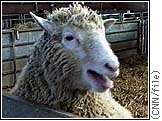|

Who? Nexia Biotechnologies Inc., a Quebec based biotechnology company and the collaboration of Genzyme Transgenetics, Tufts University School of Veterinary Medicine, and Louisiana State University.
What? Successfully cloned goat triplets. Nexia, three males, Danny, Arnold and Clint, and the U.S. group, three females.
Where? Nexia in Sainte-Anne-de-Bellevue, Quebec. The U.S. group in Charlton, Massachusetts.
When? Nexia, March 1999. U.S. collaboration, October and November, 1998
Why? Nexia have been working on the mass production of spider silk to form a product named BioSteel, by cloning the goats that carry the spider silk gene they are able to more successfully transfer the gene so that it can be useful. In the U.S., the researchers are working on a protein, Antithrombin III, that may be used to treat heart attack and stroke victims. They have genetically altered goats so they produce this protein in their milk. The goats are being cloned because, like Nexia, the researchers in U.S. feel this is a much faster and a cheaper way to produce the protein.
How? Both groups used similar methods to the methods used in cloning Dolly the sheep. First cells, from one goat, were transported to unfertilized, mature eggs that had their original nuclei removed. A nuclei removed from cells of the goat with the ability to produce the protein desired, that was grown in culture was implanted in the egg. This egg then grew into an embryo and was implanted into a surrogate goat.
|